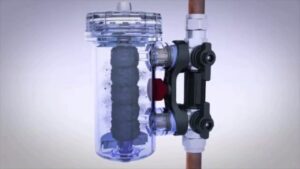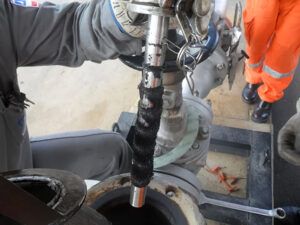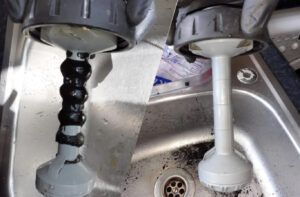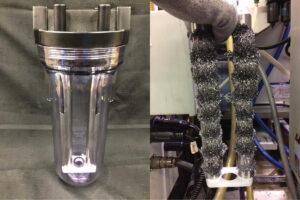Magnetic filters, also known as boiler filters, are devices that attract and collect magnetic debris from within a heating system. But are they really necessary?
As a professional magnetic filter manufacturer, I took a deep dive into the purpose, benefits, and alternatives to magnetic filters to find out.

Why Magnetic Filters Are Used
Magnetic filters are primarily used to remove metallic particles that build up inside central heating systems over time.
As water circulates through metal components like cast iron radiators, small flecks of iron oxide will break free. These flecks combine with other debris to form a substance known as “sludge.”
Left unchecked, this sludge will continue to accumulate and can lead to a number of issues:
- Blockages that restrict water flow
- Premature wear on pumps and other components
- Noisy radiators and pipes
- Reduced heating efficiency
By capturing metallic particles before they form troublesome sludge, magnetic filters help avoid these problems.
Is a Magnetic Filter Necessary?
Yes, a magnetic filter is often necessary, especially for central heating systems. It helps prevent sludge buildup and makes the boiler and other components last longer. Magnetic filters are especially important for modern, energy-efficient boilers with smaller waterways, where sludge can cause significant problems.
The Benefits of Installing a Magnetic Filter
There are several key benefits to having a magnetic filter protecting your central heating system:
1. Extends Boiler Lifespan
By preventing sludge from accumulating, a magnetic filter allows your boiler and radiators to operate efficiently for longer before needing repair or replacement.
2. Lowers Energy Bills
An efficient, sludge-free system will heat water quicker and retain heat better. This means your boiler won’t need to work as hard or as often to maintain temperature.
3. May Qualify for Extended Warranties
Some boiler manufacturers offer extended warranties on their products if paired with a magnetic filter. Vaillant, for example, provides a 10-year warranty for select models.
4. Reduces Noise and Leaks
Those annoying gurgles, bangs, and leaks could be signs of sludge buildup. A filter clears this debris to quiet things down.
5. Prevents Expensive Repairs
It’s much cheaper to occasionally clean or replace a small magnetic filter than face major boiler repairs or even full system replacements down the road.
When Are Magnetic Filters Unnecessary?
While magnetic filters offer clear benefits in most situations, there are a couple cases when they may not be required:
Already Using Corrosion Inhibitor
Some central heating systems are pretreated with corrosion inhibitors – chemicals that help prevent rust and debris from ever forming. If your system uses one of these, a filter likely isn’t needed.
Plastic Piping
Magnetic filters target metallic particles, but won’t catch other sediment-forming debris. If your system uses mostly plastic pipes (like PEX tubing), there are fewer metal flecks to collect anyway.
Magnetic Filter Options
If you decide a magnetic filter is right for your heating system, there are a few reputable options to consider installing:
Fernox TF1 Filter
- Good for smaller systems
- Rotating design allows horizontal or vertical installation
- Transparent housing lets you monitor debris buildup
Adey MagnaClean Professional3
- Ideal for large systems
- Features rapid-fit connectors for quicker servicing
- 10-year magnet warranty
Sentinel X400
- Vortex dual-action filter
- 360° installation
- 10-year warranty
I recommend consulting a professional heating engineer to advise which magnetic filter suits your particular system.
Installation and Maintenance
Most magnetic filters are installed by a heating technician onto the pipe returning water to the boiler. Installation is relatively quick and straightforward when replacing an old boiler. Retrofitting onto an existing system is possible but depends on having adequate space.
To keep the filter working properly, it should be inspected and cleaned annually – typically during routine boiler servicing. Your technician will remove built up debris and check components.
Replacement filters cost anywhere from £50-£150 depending on brand and size.
The Bottom Line
Adding a quality magnetic filter provides an affordable way to protect central heating system components from problematic sludge accumulation. For only minor additional upfront expense, magnetic filters help ensure efficient operation, reduced noise, and fewer costly repairs for years to come.
Unless your system already uses corrosion inhibitors or lacks metal components, installing a magnetic filter is usually money well spent. And with potential boiler warranty extensions as an added incentive, there’s little reason not to incorporate one. Discuss options with your heating engineer to find the best match for your home.





